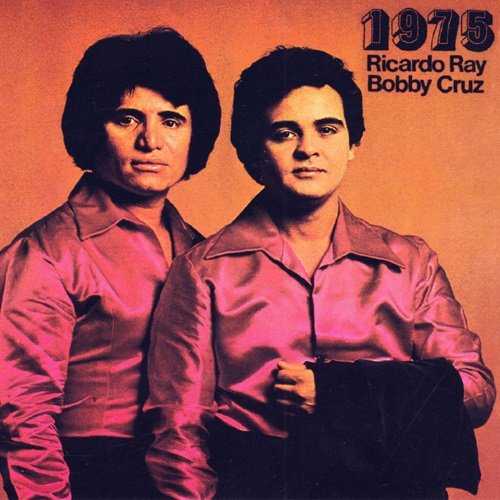Hoelderlin - Traumstadt (Reissue) (1978/2005)
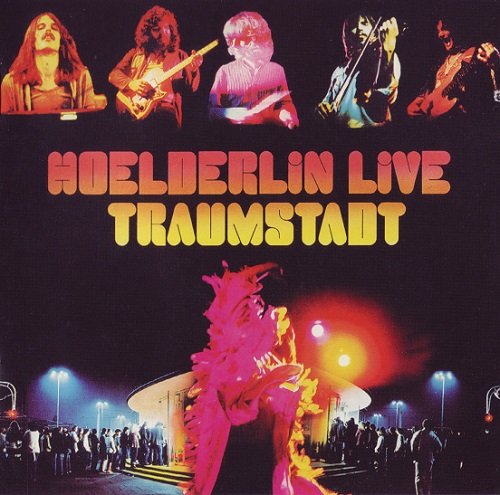
Artist: Hoelderlin
Title: Traumstadt
Year Of Release: 1978/2005
Label: Spiegelei/Intercord/EMI
Genre: Krautrock, Jazz-Rock, Prog Rock
Quality: Flac (image, .cue)
Total Time: 59:07 + 50:33
Total Size: 743 Mb (scans)
WebSite: Album Preview
Title: Traumstadt
Year Of Release: 1978/2005
Label: Spiegelei/Intercord/EMI
Genre: Krautrock, Jazz-Rock, Prog Rock
Quality: Flac (image, .cue)
Total Time: 59:07 + 50:33
Total Size: 743 Mb (scans)
WebSite: Album Preview
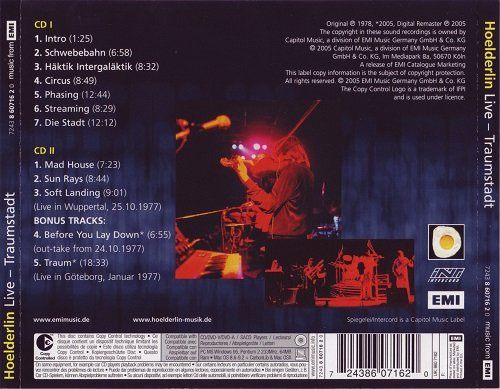
Tracklist:
CD 1:
1. Intro (1:29)
2. Schwebebahn (6:33)
3. Haktik Intergalaktik (8:08)
4. Circus (8:04)
5. Phasing (11:07)
6. Streaming (8:15)
7. Die Stadt (12:12)
CD 2:
1. Mad house (7:24)
2. Sun rays (8:44)
3. Soft landing (8:57)
Bonus Tracks:
4.Before you lay down (6:55)
5.Traum (18:33), played live in Goeteborg (Sweden)
Line-up:
Hans Baar / bass
Michael Bruchmann / drums
Joachim Grumbkow / keyboards, backing vocal
Christoph Noppeney / viola, vocals
Pablo Weeber / guitars
Founded in Wuppertal, Germany in 1970 - Disbanded in 1980 - Reformed from 2005-2009
This, in my opinion, underrated German progressive rock band has its roots in '63 when the brothers Joachim and Christian Grumbkow founded the rock-band The BEATKIDS and played covers from The BEATLES, The ROLLING STONES and The SHADOWS. In november '70 the brothers GRUMBKOW presented the name HÖLDERLIN (derived from a German romantic poet) after they had played with a sery of musicians mainly folk-rock covers (especially TRAFFIC), all layered with long instrumental improvisations. Then HÖLDERLIN got an invitation from a record company, this after only three months of their existence! The debut-album "Hölderlin's Traum" was released in '72 with a nine-piece line up, including female vocals and instruments like the Mellotron, Grand piano, violin, cello, sitar, tablas and flute. Their sound is a progressive blend of rock, jazz and folk. It sold 5000 copies and the LP is still a collector's item. But then the troubles began with their producer Rolf-Ulrich Kaiser (TANGERINE DREAM, KLAUS SCHULZE and WALLENSTEIN). He tried to force the band into a more cosmic approach ('LSD' inspired complained the band) and was not amused with the "more political oriented lyrics" as he analyzed.
It took almost three years with many juridical conflicts to get rid off the contract but eventually HÖLDERLIN won their case. Under the new name HOELDERLIN (in German the pronunciation of "oe" is the same as the "ö" and much easier to write or type) the second eponymous LP was released in 75. The band called their music 'romantic rock', it sounded more jazzy and it contained echoes from KING CRIMSON and GENESIS. HOELDERLIN toured through Scandinavia, Holland, Germany and Switzerland, got good reviews and radio - and tv-airplay. In '76 HOELDERLIN released the album entitled "Clowns and Clouds". The music consists of more complex rock with many theatrical and surrealistic elements. In '77 Christian had a mental breakdown, he could no longer combine the too busy work with the band and his family life (the upbringing of two children). He left and Spanish guitar player Pablo Weeber joined HOELDERLIN. In '77 they released the album "Rare Birds", a year later followed by the 2-LP "Hoelderlin Live Traumstadt". Soon after the unstable personality of Pablo led to his dismiss. "Traumstadt" got very good reviews, it even reached the German charts. Further releases were "New Faces" ('79) and "Fata Morgana" ('81), including new drummer Eduard Schicke, know from the progrock trio SCHICKE, FUHRS, FRÖHLING. These albums have a more accessible melodic rock approach.
The double-album "Hoelderlin Live Traumstadt" is their finest work and showcases the band at their pinnacle. It's still considered as one of the milestones in the German rock history and has some similarities with other German progrock band GROBSCHNITT concerning the long solos, visual effects, costumes and humor. The music was recorded in the Wuppertaler Opernhaus in October '77, the 2-LP was released in '78. The band was hit by multiple changes in the line-up, on "Traumstadt" the musicians were Joachim Grumbkow (keyboards and vocals on "Streaming"), Pablo Weeber (all guitars), Michael Bruchmann (drums), Cristoph 'Nops' Noppeney (lead vocals and violin) and Hans Bäär (bass). All the nine melodic tracks have their own climate and features fluid accelerations, nice interludes, pleasant keyboards (string-ensemble, electric piano, organ and clavinet) and great interplay between electric guitar and violin. But the focus is on the solo work: fiery ("Sun Rays"), biting ("Soft Landing") and howling ("Die Stadt") on the electric guitar and exciting ("Streaming") and spectacular ("Die Stadt") on the violin. Many solos are supported by the wonderful and distinctive sound of the string-ensemble, a compelling combination! Recommended, especially to the fans of the violin play of Jean Luc PONTY and Eddie JOBSON.
This, in my opinion, underrated German progressive rock band has its roots in '63 when the brothers Joachim and Christian Grumbkow founded the rock-band The BEATKIDS and played covers from The BEATLES, The ROLLING STONES and The SHADOWS. In november '70 the brothers GRUMBKOW presented the name HÖLDERLIN (derived from a German romantic poet) after they had played with a sery of musicians mainly folk-rock covers (especially TRAFFIC), all layered with long instrumental improvisations. Then HÖLDERLIN got an invitation from a record company, this after only three months of their existence! The debut-album "Hölderlin's Traum" was released in '72 with a nine-piece line up, including female vocals and instruments like the Mellotron, Grand piano, violin, cello, sitar, tablas and flute. Their sound is a progressive blend of rock, jazz and folk. It sold 5000 copies and the LP is still a collector's item. But then the troubles began with their producer Rolf-Ulrich Kaiser (TANGERINE DREAM, KLAUS SCHULZE and WALLENSTEIN). He tried to force the band into a more cosmic approach ('LSD' inspired complained the band) and was not amused with the "more political oriented lyrics" as he analyzed.
It took almost three years with many juridical conflicts to get rid off the contract but eventually HÖLDERLIN won their case. Under the new name HOELDERLIN (in German the pronunciation of "oe" is the same as the "ö" and much easier to write or type) the second eponymous LP was released in 75. The band called their music 'romantic rock', it sounded more jazzy and it contained echoes from KING CRIMSON and GENESIS. HOELDERLIN toured through Scandinavia, Holland, Germany and Switzerland, got good reviews and radio - and tv-airplay. In '76 HOELDERLIN released the album entitled "Clowns and Clouds". The music consists of more complex rock with many theatrical and surrealistic elements. In '77 Christian had a mental breakdown, he could no longer combine the too busy work with the band and his family life (the upbringing of two children). He left and Spanish guitar player Pablo Weeber joined HOELDERLIN. In '77 they released the album "Rare Birds", a year later followed by the 2-LP "Hoelderlin Live Traumstadt". Soon after the unstable personality of Pablo led to his dismiss. "Traumstadt" got very good reviews, it even reached the German charts. Further releases were "New Faces" ('79) and "Fata Morgana" ('81), including new drummer Eduard Schicke, know from the progrock trio SCHICKE, FUHRS, FRÖHLING. These albums have a more accessible melodic rock approach.
The double-album "Hoelderlin Live Traumstadt" is their finest work and showcases the band at their pinnacle. It's still considered as one of the milestones in the German rock history and has some similarities with other German progrock band GROBSCHNITT concerning the long solos, visual effects, costumes and humor. The music was recorded in the Wuppertaler Opernhaus in October '77, the 2-LP was released in '78. The band was hit by multiple changes in the line-up, on "Traumstadt" the musicians were Joachim Grumbkow (keyboards and vocals on "Streaming"), Pablo Weeber (all guitars), Michael Bruchmann (drums), Cristoph 'Nops' Noppeney (lead vocals and violin) and Hans Bäär (bass). All the nine melodic tracks have their own climate and features fluid accelerations, nice interludes, pleasant keyboards (string-ensemble, electric piano, organ and clavinet) and great interplay between electric guitar and violin. But the focus is on the solo work: fiery ("Sun Rays"), biting ("Soft Landing") and howling ("Die Stadt") on the electric guitar and exciting ("Streaming") and spectacular ("Die Stadt") on the violin. Many solos are supported by the wonderful and distinctive sound of the string-ensemble, a compelling combination! Recommended, especially to the fans of the violin play of Jean Luc PONTY and Eddie JOBSON.
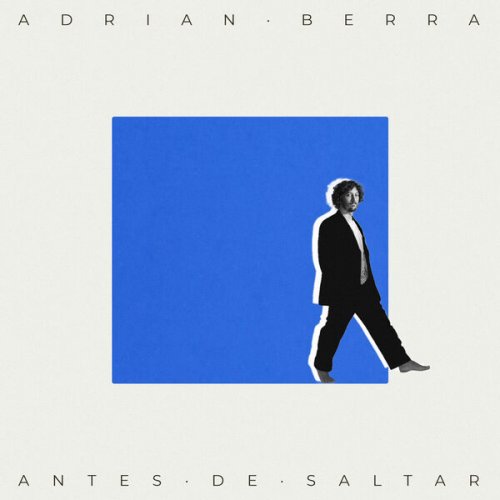
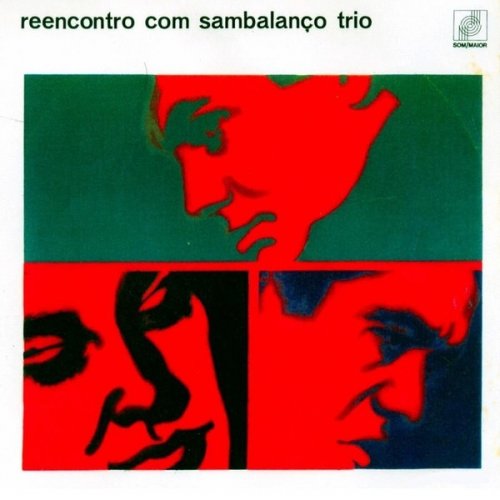
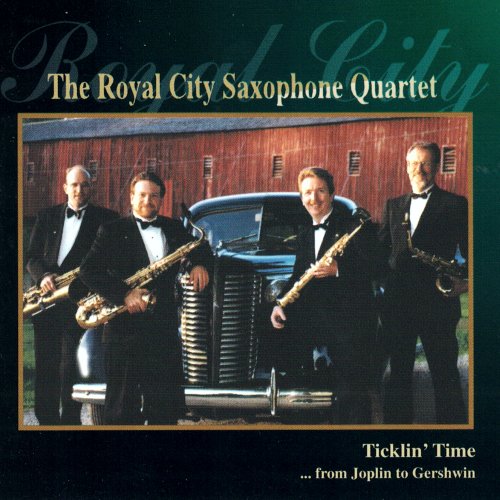
![Stefano Battaglia, Stefano Battaglia Standards Quartet - One Mile Away (2026) [Hi-Res] Stefano Battaglia, Stefano Battaglia Standards Quartet - One Mile Away (2026) [Hi-Res]](https://www.dibpic.com/uploads/posts/2026-03/1772346486_cover.jpg)
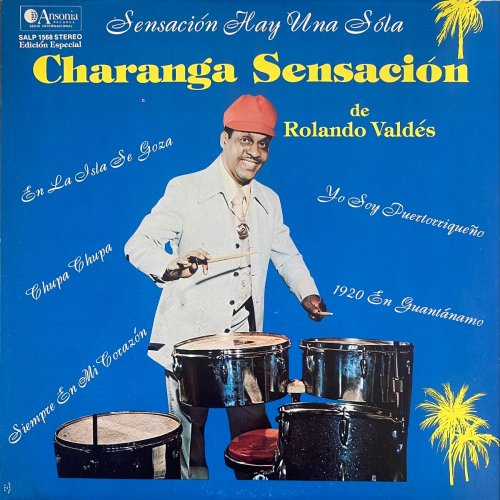
![Herminio Bello De Carvalho - Hermínio Bello de Carvalho 90 (2026) [Hi-Res] Herminio Bello De Carvalho - Hermínio Bello de Carvalho 90 (2026) [Hi-Res]](https://img.israbox.com/img/2026-03/01/7d9otuo4k41izuhqy3mc75spu.jpg)
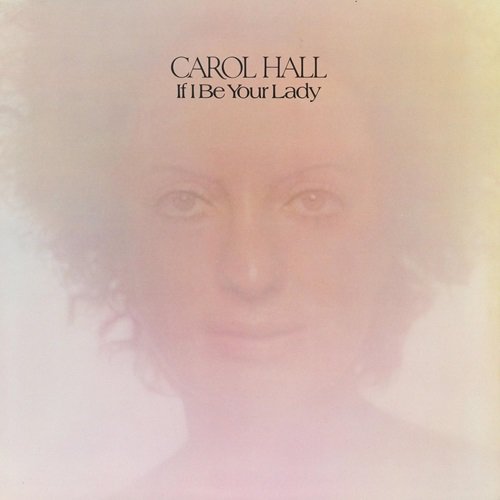
![Kobert - Off the Hook (2011) [Hi-Res] Kobert - Off the Hook (2011) [Hi-Res]](https://www.dibpic.com/uploads/posts/2026-03/1772434077_lnz36qc7wmx6u_600.jpg)
